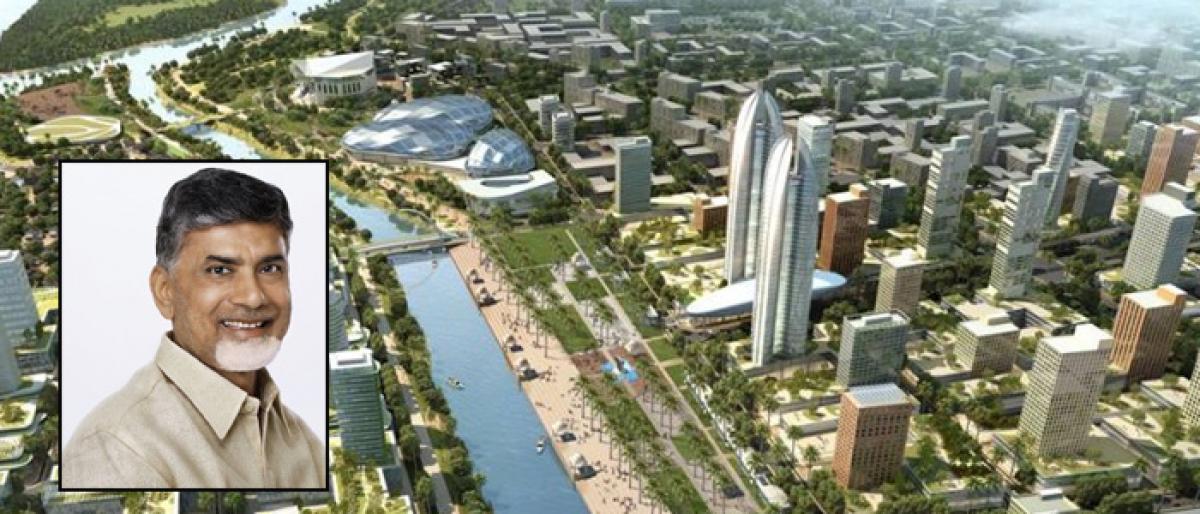Live
- Festival of Demiocracy: 62% turnout in phase 1
- MyVoice: Views of our readers 20th April 2024
- Is US Prez weighing climate emergency declaration soon
- ‘AP people’ve made up their mind on double engine govt’
- Caught unawares: Dubai must brace for future storms
- DEO suspends teacher accused of sexual assault
- PM ‘cursing’ Congress out of despair: Maharashtra Cong Chief
- Applications are invited for Junior Colleges Scheme District Scheduled Castes Development Officer Ramlal
- A nomination was filed on the second day for the Nagar Kurnool parliamentary seat
- SP Gaikwad inspected the Telangana Amarnath Saleswaram Jatara yatra arrangements
Just In

The Chief Minister of Andhra Pradesh made an announcement on the floor of the Assembly that he would raise funds as loan from the public for the construction of the capital city Amaravati. He promised to pay an interest rate higher than the market interest rate and exhorted the public to contribute to the loans or bonds issued for this purpose.
The Chief Minister of Andhra Pradesh made an announcement on the floor of the Assembly that he would raise funds as loan from the public for the construction of the capital city Amaravati. He promised to pay an interest rate higher than the market interest rate and exhorted the public to contribute to the loans or bonds issued for this purpose.
To build up the public support in favour of the proposal of the government a leading Telugu vernacular daily on Monday carried a headline news item “Rajadhaniki Praja Dhanam.” For a moment putting aside the desirability of going in for capital city construction as a mega city, I would like to examine the feasibility of raising any such loans from the public for construction of the capital city by the state government and options available before the state government.
Broadly borrowings of the state governments are covered by Article 293 of the Constitution. This article gives the authority to the state government to borrow within the limits as fixed by the legislature and also permits Government of India to make loans to the states. But the real catch is in Article 293 (3). As per the provision in this article, the state government may not without the consent of Government of India raise any loans if there is still outstanding any part of loan which has been made to the state by the Government of India.
Since state governments have an unpaid liability of loans to the Government of India, they necessarily have to take Government of India permission under this article to raise any loans. The parameters of how much each state can be permitted to borrow is fixed with reference to the limits set by the FRBM Act and to that extent only Government of India will permit the State government to borrow. In any case, these are general borrowings for overall capital expenditure of the state government and for meeting revenue deficit but not necessarily grants tied to the capital city construction.
The other option available is not for the state government to borrow but for the quasi-government entities to borrow from the banks and other financial institutions for taking up commercially viable activities.
Here the entities are as good as private organisations when they approach the financial institutions and have to convince the financial institution about the commercial viability of the project before any amount is sanctioned. Only additional advantage these institutions can have is support in terms of the state government guarantee to assure certain level of comfort to the financial institutions while lending to such entities.
When this is the broad framework in which state government can raise funds for taking up any projects how the state government is planning to raise the funds from the public with a guarantee to repay them for the construction of the capital city looks a little puzzling. If the project is commercially viable, they can approach any of the banks to get a loan and, if required, provide the necessary government guarantee as a measure of comfort.
If this proposal cannot go through this process of sanction of loans by the banks, how the state government is planning to raise these amount from the public and pay back to them is beyond anyone’s comprehension. In any case, public may not have the necessary expertise to appraise the project and decide whether the project is commercially viable or not as compared to the financial institutions.
Sometime back there was also a similar project announced by the state government with a lot of fanfare in the name of ‘My brick and my Amaravati.’ An amount of Rs 5 crore seems to have been collected as on date under this project. Though it’s a laudable effort to get people involved in the capital city construction by paying nominal voluntary donation, this project substantially differs from the one that is now planned in terms of raising of loans from the public for construction of the capital city.
Any loan raised carries responsibility of repayment. Without making necessary provision for repayment and commercial viability of the project, committing the state to a loan liability is suicidal. Or having dealt with AgriGold scheme has the government perfected similar scheme for implementation by the government?

© 2024 Hyderabad Media House Limited/The Hans India. All rights reserved. Powered by hocalwire.com







